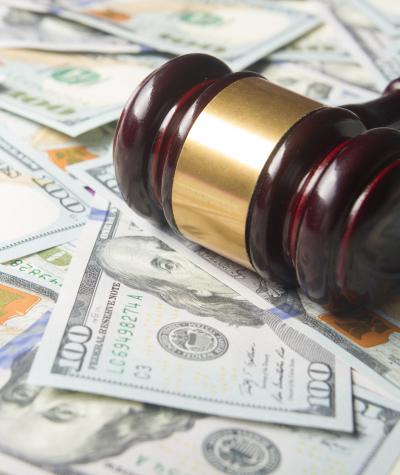Campaign Legal Center (CLC) has filed an amicus brief in New Jersey Bankers Association v. Grewal urging the U.S. Court of Appeals for the 3rd Circuit to affirm a district court decision that upheld New Jersey’s longstanding ban on campaign contributions from banks and certain other corporations.
In November 2018, the New Jersey Bankers Association — a trade group representing New Jersey-based banks — filed a lawsuit in federal district court challenging New Jersey’s century-old statute, claiming it violates the First Amendment. CLC filed an amicus brief in the district court explaining why New Jersey’s law easily passes constitutional muster.
The district court upheld the statute in June 2021. With frequent citations to CLC’s original brief, the court concluded that New Jersey’s law advances the state’s compelling interest in addressing actual and apparent corruption. The Bankers Association appealed that decision to the 3rd Circuit, where CLC filed its amicus brief on Feb. 11, 2022.
As the district court correctly recognized, New Jersey’s statute, “is not an outlier compared to other states’ restrictions” on contributions. At least 23 states (and the federal government) prohibit corporate contributions to candidates, and several states — like New Jersey — impose special restrictions on banks.
Many states and localities have also passed “pay-to-play” laws limiting or barring campaign contributions by certain highly regulated industries, such as utilities and lobbyists.
States have good reason to pass these restrictions: as CLC’s brief explains, contributions from the banking industry pose a well-documented risk of actual and apparent corruption.
For example, recent years have seen a number of SEC enforcement actions sanctioning financial firms for unlawful campaign contributions to government officials who oversee public investments.
In addition to this history of enforcement actions, empirical research confirms that political contributions from banks and other financial institutions create a unique risk of corruption.
Studies show that contributions by banks influence politicians’ allocation of government investments, affect elected officials’ willingness to regulate or bail out firms, and decrease the likelihood and severity of enforcement actions.
These effects are stronger in jurisdictions with histories of public corruption and may have “played a role in the accumulation of risks . . . [that] contributed to the [2008] financial crisis.” This unique corruption risk supports New Jersey’s decision to place special campaign finance restrictions on banks.
New Jersey’s contribution ban also helps limit the appearance of corruption. The banking sector spends enormous sums on campaigns at the federal level, and Americans across the political spectrum perceive that these contributions lead to favorable treatment by elected officials.
Several members of Congress have acknowledged as much: Sen. Sherrod Brown, for instance, has observed that the financial sector “can always find Members in [Congress] who are fueled by lots of Wall Street contributions . . . to do [its] bidding.” New Jersey’s contribution ban prevents similar concerns at the state level.
Given these corruption concerns, it’s no wonder that the U.S. Supreme Court upheld the broader federal ban on all corporate contributions to federal candidates in Federal Election Commission v. Beaumont.
CLC’s brief explains that Beaumont dictates the outcome of this case and urges the 3rd Circuit to join other state and federal appellate courts from across the county in applying that decision to uphold a state campaign finance law.
Finally, CLC’s brief explains how — far from violating the First Amendment — strong campaign finance laws like New Jersey’s contribution ban actually advance core constitutional values. The First Amendment protects a democratic system in which “the great body of the people,” rather than “a favored class,” governs.
The statute challenged in this case protects this model of self-governance by ensuring that all state residents — not a few powerful donors — call the tune in New Jersey’s government.
New Jersey’s prohibition on political contributions by banks aligns with laws from numerous other jurisdictions, advances vital anti-corruption objectives, squares neatly with Supreme Court precedent and buttresses the First Amendment’s protection of democratic self-government.
The district court properly upheld the statute, and the 3rd Circuit should affirm that decision.
